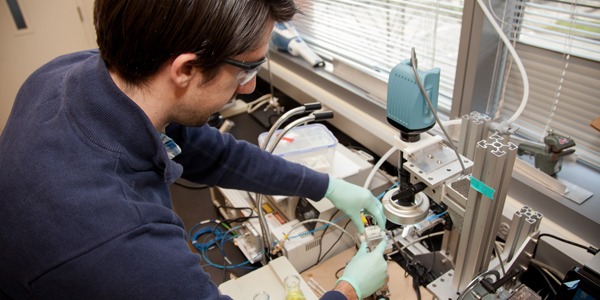This month, UW Bioengineering will begin accepting applications for its newest master’s degree program, the Master of Applied Bioengineering (MAB). The one-year, full-time program kicks off in August 2016.
The fast-track program trains students to apply engineering design and entrepreneurship education to address unmet clinical needs, and to transform biomedical research into technologies for improving health care. The degree positions graduates to respond to market-based demands of industry, medicine and translational research.
“Our industry partners tell us they want graduates who have hands-on experience, and practice working in teams and solving real world problems in a clinical environment,” says Wendy Thomas, vice chair of academic affairs and associate professor of bioengineering. “Our graduates will also have practice working with all constraints of the business environment and the communication skills needed to facilitate a team of engineers, scientists, clinicians, business and venture capital investors.”
“The project-based master’s in applied bioengineering was designed to meet industry needs, and our industry partners are enthusiastic about the program,” Thomas says.
Solve real clinical problems
Students will work alongside UW Medicine clinicians and UW faculty to identify unmet clinical needs and engineer practical solutions. UW Bioengineering’s clinical partnerships in the top-ranked School of Medicine provide an intensive mentoring experience with clinicians and first-hand learning about clinical culture and ethics.
“Bringing students into the clinic to conduct needs assessments provides three important benefits,” says Christopher Neils, senior lecturer and co-director of the MAB. “In addition to identifying ways that new technology can be applied to improve clinical practice, students will practice communicating within a medical care environment, and gain a contextual background that will help them design solutions that are practical and effective.”
Following the clinical experience, students will work in small teams on a unique design project to solve one of the real-world clinical problems during the academic year. Students will conceive, design, develop and test a new biomedical device, process or technology, typically carrying the project through the proof-of-principle prototyping phase. Design instruction includes a set of core topics – principles for medical technology development, engineering design tools, and prototyping methods – as well as mentoring that is tailored for the particular team projects.
Students have two options for their second-stage capstone experience: a summer industry internship or development of a device in an intensive process that complements their year-long intensive design project.
Entrepreneurial focus
The MAB builds on UW Bioengineering’s successful record of patents, licensing and start-ups, which is fostered by a strong culture of entrepreneurship that is characteristic of the UW College of Engineering. MAB students will take UW Bioengineering’s existing Program on Technology Commercialization series, and industry partners will serve as design project consultants; together these components provide an emphasis on entrepreneurship and business plan development.
“Students will graduate as confident team leaders, with an understanding of the regulatory aspects of bringing a new technology to market,” Thomas says. “We’re teaching the traits of entrepreneurship.”
She notes there will be an added benefit of working with other focused students who have education and experience in a range of engineering fields, contributing to the creative environment. Students will be encouraged and prepared to participate in the UW’s spring-quarter Business Plan Competition at the Foster School of Business.
Range of emphasis areas
The degree program capitalizes on the department’s strengths, offering degree focus areas in biomaterials, imaging and molecular bioengineering. UW’s history of past success in transferring bioengineering applications into clinical use means students will work with faculty mentors and clinical partners with experience in the process.
“We’re offering the opportunity to work with faculty who are experienced in not only going through a bioengineering medical application design process, but with educating and mentoring those activities,” Neils says.
As part of the mentorship experience, students will learn professional skills in resume writing, interviewing and conducting a job search, and develop a professional portfolio to showcase their accomplishments.
Strong candidates for the program will have a bachelor’s or higher level degree in engineering, biological, physical or other applied scientific disciplines.
To learn more about the program and how to apply, visit UW BioE’s MAB page or contact the program academic counselor at bioeng@uw.edu.


